"The important factor is that inflation expectations are under control. Unlike the 1970s, the Fed doesn't have to react violently to control secondary and third-round inflation effects."
Ben Bernanke
Council of Economic Advisers Chairman
Monday, September 26, 2005 09:37 GMT
Nowhere to Go
What a dead week. The dollar gained a whopping 23 basis points on the euro and for most traders the prospect of dental work without anesthetic was more welcome than watching the price screens. The complete absence of volatility became evident on Thursday when the US open saw a measly 10 point range in the EUR/USD for three full hours.
The economic news was actually dollar friendly with both the Durable Goods and Chicago PMI data printing way above expectations at 3.3% and 60.5 respectively indicating that the pre-Katrina slowdown may have been a lull and not a precursor to a full-scale decline. Yet the dollar failed to make much headway as the 1.2000 level was bought over and over again. At 1.2000 the euro simply represents good value and Central Bank bids are likely to keep the currency within this level unless the market sees materially better news from US.
On that count both the manufacturing and non-manufacturing ISM will the primary event risks at the beginning of the week but the marquee release will be Friday’s NFP. Because of Katrina the market expects a steep decline to –168K. Ironically enough the dollar may rally if number prints better than expected, although in absolute terms it will no doubt be a significant decline from the month prior.
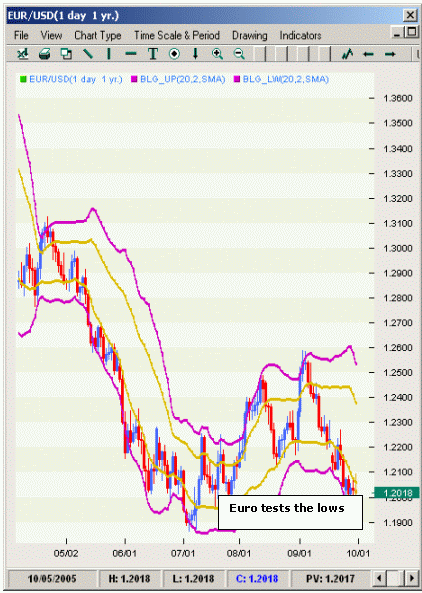
"The government has built its budget on a growth forecast of 2.25 pct. This is a realistic target and we are doing everything possible to surpass it. I requested a budget to support employment, spending power and the preparation of the future. This 2006 budget meets this requirements."
Jacques Chirac
France President
Wednesday, September 28, 2005 15:23 GMT
Ho Hum
Still no resolution on the German election though the idea of a grand coalition is becoming more and more likely and should it happen would eliminate the uncertainty risk that has hung over the euro for the past few weeks. Meanwhile the eco data was merely tepid with German unemployment printing worse than expected at +39k indicating that the economy is still to weak to generate any meaningful growth. The one tiny bright spot was the slightly firmer IFO results. The boost in business confidence comes from the fact that the lower euro has helped increase demand for the export driven region production. And as we wrote earlier in the week the path to a higher euro may first be through a lower euro that will continue to spur growth in the Euro-zone.
On the calendar this week is a series of PMI releases both in manufacturing and retail which shed some light on the state EU economy but unless the data is materially different from expectations the back and forth between the euro and the dollar is likely to continue.
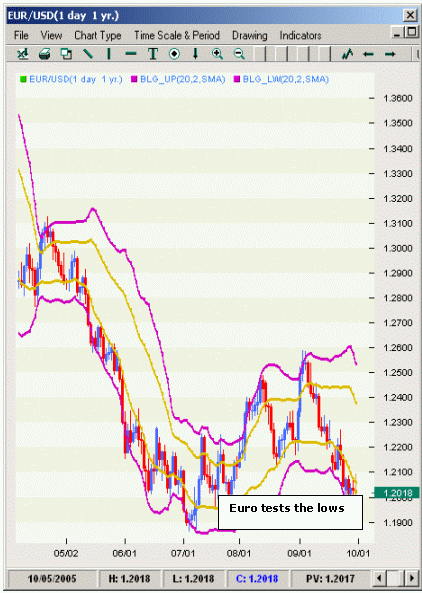
"As deflation is continuing, there is no change in the need to do our utmost to fight it. The BOJ governor has said they will continue with their loose monetary policy under their CPI-based commitment. We have a shared understanding."
Koichi Hosokawa
Japanese Vice Finance Minister
Thursday, September 29, 2005 10:23 GMT
Tankan On Deck
The yen was the worst performing major against the dollar this week, pressured in part by persistently high oil prices but primarily by carry flows as the yield on USD/JPY expanded to 375 basis points. The eco news however continued to paint rosier picture with unemployment dropping to 4.3%, Household spending still negative but less than anticipated and inflation ticking up albeit by a mere 0.1%. The employment data remains the single best chance of hope for the recovery in the Japanese economy. With unemployment rates now at yearly lows, consumer confidence and in turn spending should improve. A decline in oil prices would be extremely positive and yen could verticalize like a rubber ball under water if energy prices declined. For now however, yen bulls have nothing to do but wait, as the unit is unlikely to find strength from domestic news alone.
Next week kicks off with the most important economic release of the quarter - the TANKAN report and the market expects a jump to 22 from 17 which should be consistent with the improving tone of the economy. With little other news for rest of the week, it will be interesting to see if yen will finally find a bid as specs book some profits or whether the market will try to test the very long term resistance at the 114-115 level.
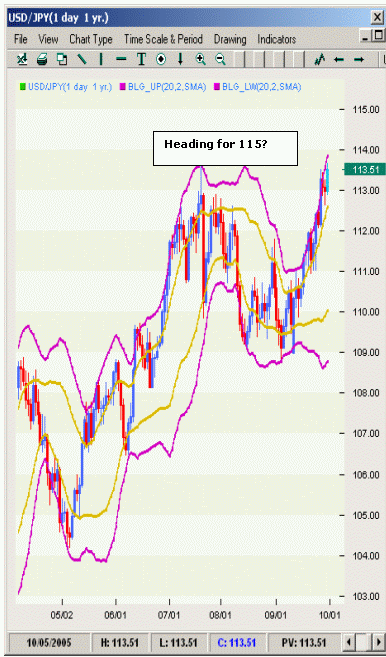
"Following the implementation of the planned reforms to money market operations, bankers' balances are likely to increase greatly in size and be subject to very different influences from those driving notes and coins. The Bank is therefore proposing to discontinue the publication of an aggregate M0 series and instead publish separate series for notes and coins in circulation, and reserves of banks and building societies held with the Bank."
Charlie Bean
BoE's chief economist
Monday, September 26, 2005 08:48 GMT
Pounded
Cable woes continued this week with the unit losing a further 79 basis points this week as market fears about UK slowdown increased after CBI Distributive Trades report dropped to a -14 month low
Next week the focus turns to Industrial and Manufacturing production both of which are expected to pick up slightly from the month before. However, if the results continue to be negative the pressure on BOE to lower rates further will increase. The bank is likely to maintain a stiff upper lip, keeping the repo rate at 4.5%, at this Thursday’s meeting, but if the eco newsflow continues to show contraction, pound shorts will attack the unit like sharks circling a pool of bloody water. One positive for pound longs is the fact that currency is approaching long term support at 1.7400 and if in turn the news turns out to be not as dire as expected, the short covering which would ensue could fuel a pretty vicious rally to the upside.
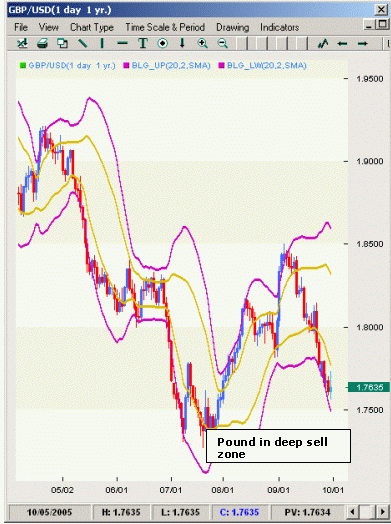
Swissie Stabilizes
Swissie finally found some support declining by the least amount against the dollar. Much like the yen, the currency has been the victim of carry flows. Its fundamentals however have improved markedly throughout the decline. Last week the KOF index – the most important indicator out of Switzerland – printed at 77, far netter than 70 expected. As we noted earlier in the week,” Tiny Switzerland has been the hidden growth story on the European continent as its export-skewed economy has been the primary beneficiary of lower exchange rates, the currency, however, much like [comedian] Rodney Dangerfield, has gotten 'no respect' for the past two weeks, falling against both the dollar and the euro. The recent decline in the Swissie can be directly linked to the use of the franc as the key funding currency for carry trades."
Next week we’ll see if the better economic results will translate into firmer employment numbers which in turn may lead to a more hawkish monetary policy making the franc less vulnerable to carry flows.
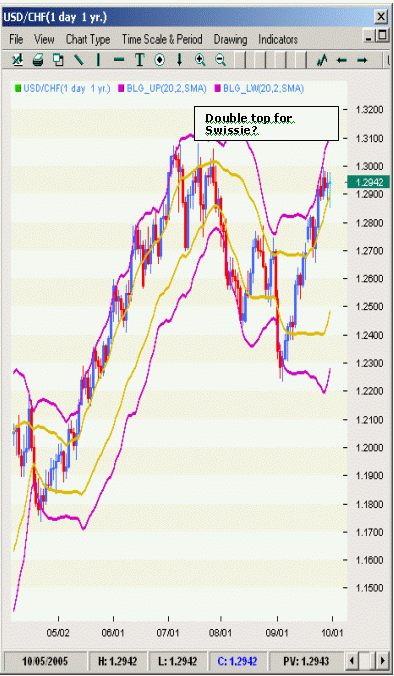
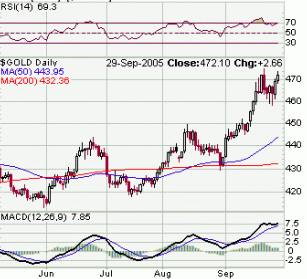
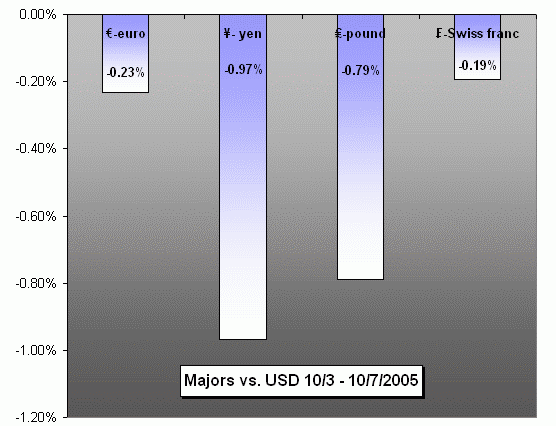
Boris Schlossberg is a Senior Currency Strategist at FXCM.